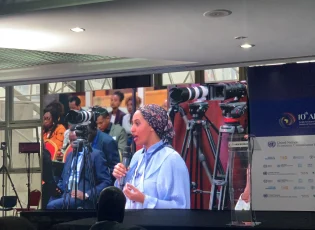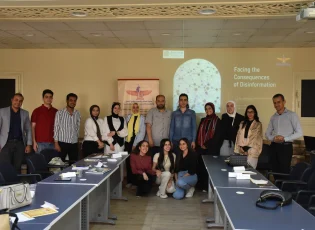The Maat Center for Legal and Constitutional Studies held a training course to train Sohag's lawyer on “legal procedures related to detainees' cases”, within the framework of the center's interest in disseminating legal and human rights culture among lawyers, especially on issues of freedoms and citizenship rights, and strengthening the right to express opinion and expression guaranteed by the constitution Egyptian and international charters
The activities of this session continued on 4 and 5 May in Sohag governorate - 25 lawyers participated in this session
The activities of the training course began with the opening speech delivered by Professor / Ayman Aqil, Director of the Center, which included stressing the importance of the role provided by legal professionals in supporting rights and freedoms and achieving justice in their homelands, especially in a country like Egypt that has been living in a state of emergency for more than Quarter of a century…. This has led to high rates of violations of public rights and freedoms
He also pointed to the seriousness of what was proposed by the constitutional amendments recently approved, including the text of Article 179 concerned with combating terrorism, which was formulated without real guarantees that ensure that individual freedoms are not compromised, and he expressed that the situation will worsen if the next terrorism law is formulated in the same way and in the content in which it was formulated. Those constitutional amendments
He concluded his speech by stressing the Center’s willingness to adopt the issue of any detainee inside this country, and he welcomed all those who wish to join the Center to provide the necessary support to all opinion-holders whose right has been violated, especially the category of detainees and their families.
The training included introducing lawyers to the legal texts related to the laws of criminal procedures and penalties, as well as the international human rights instruments that Egypt signed to become part of its internal legislation, in addition to explaining everything related to the provisions of the emergency law and the stages of its application in Egypt's modern history. Highlighting the role of lawyers with the profession of freedoms in defending the victims of the emergency law and its permanent state, and discussing aspects of coordination between human rights activists, politicians and the media to make the arrest disaster and the consequences of their first case.
The crime of torture has been addressed and its position in Egyptian law and its consistency with what is stated in the relevant international conventions, considering that Egypt, according to reports of international organizations, including Amnesty International, practices systematic torture.
The lecturers discussed with the trained lawyers the problem of the terrorism law in light of the effects of globalization that reflected on the Egyptian legislative system, especially after the constitutional amendments that were recently approved, and the government’s proposal for a new draft terrorism law that may come along the lines of Law No. 97 of 1992, which was challenged by not Constitutionalism in more than one place
The session also addressed the issue of impediments to the implementation of judgments issued by the administrative judiciary, and the crisis of the lack of a special apparatus to implement judgments issued against employees of state agencies, as is the case with regard to the lawsuits filed against the Minister of Interior and others, which impede the practical implementation of the rulings issued by them and make them virtually useless
At the end of the course, the trainees expressed their readiness to join the Egyptian Network for the Defense of Detainees, which was established in July 2006, and among its objectives was to defend public rights and freedoms guaranteed by international conventions, especially the rights of detainees, as their right to freedom of opinion and expression has been violated. The trainees also praised the information and experience they gained during the training courses on how to deal with legal issues of detention, and called on the center to organize more courses in Upper Egypt governorates, especially Sohag, to participate in raising human rights and cultural awareness for Upper Egyptians
Take part in the training
Mr. Muhammad Radi Masoud (Lawyer of Cassation)
Professor / Jamal Barakat (Lawyer)
Professor / Ayman Aqil (Lawyer - Director of Maat Center for Legal and Constitutional Studies)
Set reading font size










